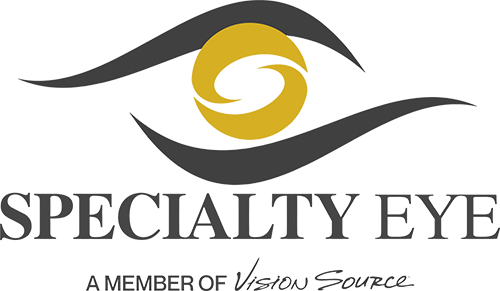Our Eyes Are Tired & Strained
We work for hours in front of a computer, and we take breaks by looking at our phones. At home, we unwind in front of the TV. While we may be relaxing our bodies and minds, our eyes are working overtime.
Digital eye strain affects around 90% of people who use digital devices. So, what can we do to alleviate all of the stresses on our eyes? There are a handful of good habits you can build right at your desk, or anywhere you use screens.
You can get a full assessment of your eye health and discuss digital eye strain directly with your optometrist at Specialty Eye.

What is Digital Eye Strain?
Let’s start with what actually causes digital eye strain. Sometimes called “computer vision syndrome,” digital eye strain is a group of issues our eyes experience from prolonged screen use and near activities.
The average American uses digital screens for around 7 hours per day, working in an office setting. And, the visual demands of using those screens could make you more susceptible to developing screen-related visual symptoms.
If you use digital screens, you may experience problems like:
- Strained, fatigued eyes
- Headaches
- Blurry vision
- Dry eyes
- Neck & shoulder pain
Alleviate the Strain
There are a few things you can do to help relieve some of your digital eye strain. The most obvious (but often unattainable) advice is to minimize your screen time. Here are some more tasks you can do from the comfort of your work or home.
Take Breaks
It has been a long day at the office, and you’re working hard at your computer. But when was the last time you got up? Don’t forget to grab a glass of water and say “hi” to your coworkers from time to time. Your eyes will appreciate the break from your screen.
Another great way to take a quick break is to practice the 20-20-20 rule: after 20 minutes of looking at your screen, look at something 20 feet away, for 20 seconds. This gives your eyes a chance to focus on something at a further distance. It’s like taking a deep breath, but for your eyes. You can even download an app for that, or set a timer to remind you.
The quickest break you can give your eyes goes by in a blink of an eye. No really, don’t forget to blink! Computer users blink 50% less than those who don’t use their screens often.
Adjust Your Work Space
Office ergonomics do wonders for your body and your eyes. Try to arrange your workspace so you are sitting up straight, with both feet on the floor. Keeping your computer screen about an arm’s length away and the center 20-degrees below eye level, is generally the most comfortable for your eyes and neck. If you’re using reference materials, try to put them beside your screen to minimize how much you have to move your head around.
Lighting is also important. Try to ensure your screen isn’t reflecting any glare from overhead lights or nearby windows. Keep it free of dust and fingerprints so you have a nice, clear view of what you’re trying to look at.
Wear Proper Lenses
If you need prescription lenses, wear them. You may struggle to see without them, causing even more strain. Keep up with your eye exam routine to ensure you’re wearing the right prescription, whether it’s glasses or contact lenses.
Need More Information?
If you’re experiencing the effects of digital eye strain, you can try to follow these steps at home or at work. Specialty Eye is always here to address any of your eye health and vision concerns, so request your appointment and talk to us today. We’re happy to help.

